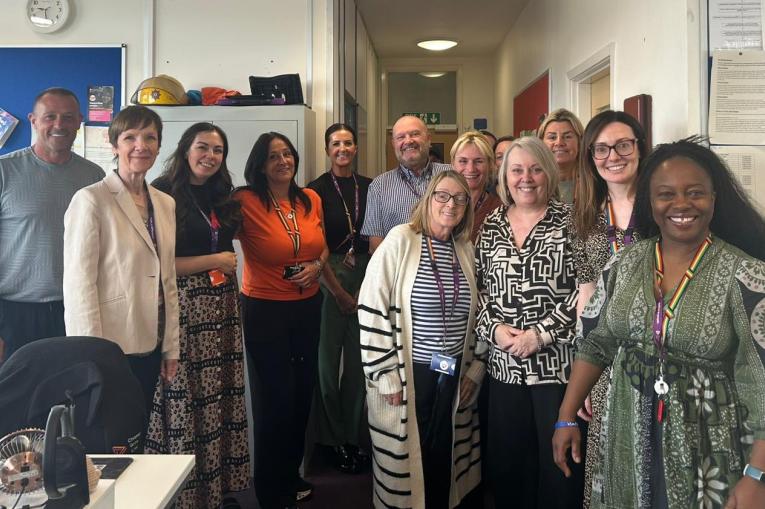18 June 2025
Change Grow Live’s ability to connect with people who need our support relies on our services becoming trusted spaces within the community, building up strong local partnerships and responding to the very specific needs of each town or city.
This is particularly evident in our St Helens Integrated Recovery Service in Merseyside. The town of St Helens has some of the highest rates of drug use in the country, while the closure of key industries means many residents are struggling to find work.
In May, Change Grow Live Trustee Dr Caroline Shuldham visited our St Helens service, and found a thriving community space, with people at the heart of everything they do. Their holistic approach – with multiple services available in one building – is helping people into employment, supporting those leaving prison, and keeping families together. Dr Shuldham explains more.

One of the things that struck me about St Helens Integrated Recovery Service was that they talked about not just getting people off substances, but about helping them change their lives. The ‘whole family, whole person concept’ is really important.
The phrase they use is ‘a trusted front door to wider healthcare’: they have a team that do initial assessments, then they book any appointments straight away. People are not left thinking, “what's happening? Nobody's come back to me.” That has been successful in getting people into the service.
The idea is to reach everyone who needs them, so the commitment to partnerships is big. They work with hostels, the police, education, the NHS and Liverpool John Moore's University, and have all sorts of students in for clinical placements. They also welcome people from other organisations to run clinics on-site. Their urology, COPD and diabetes clinics, for example, are all run by staff from other services. It isn't just about getting people off drugs and alcohol; it's about the whole person and how they live. Providing lots of services helps with that.
They are a really compassionate, committed and caring team, who see their role widely, not narrowly focused.
On this principle of ‘look after the whole person’, there’s a treatment room where the nurses can provide wound care, whether it’s a drug-related wound or not. Staff will even go and remove drug paraphernalia from the streets, if that's what's needed, to try and clear up the town. It’s the whole thing of promoting a good environment.
The power of teamwork – and strong teams
One of the big takeaways was the power and effectiveness of a good team working well together. The St Helens team really comes across as providing good leadership and taking pride in their work and I came away really admiring of them.
Something I was told more than once was that they felt very lucky with their team. I suggested to them that wasn't so much luck as how they work together, and it was down to their enthusiasm and commitment. I was told that over 55% of the staff had previously used our services – and they have a waiting list for volunteers.
They use the word ‘lucky’ – I think they are making it good. They came across as having a huge commitment to support service users in the borough in any way that they can, and also to support each other.
On the day I was there, it was the doctor’s birthday. His office had ‘Happy Birthday’ banners hung outside and he arrived loaded down with cakes and biscuits. You don't do that if you're not in a cooperative, happy team!
One of the things they've done for staff is create a role for a chaplain – this role is new to Change Grow Live. The chaplain is someone that they knew already; she had been a GP, then became a chaplain and now she leads sessions that are supportive of service users and of staff. It was made clear that the staff really value this role and it is helpful to them.
A family-first approach
Children's needs are at the heart of all of St Helens’ family work. The team see themselves as family workers who specialise in substance use: the family comes before the substance. What they're trying to do is bring children, parents and families together.
They have a family support programme called Building Bridges, and within that is a Moving Parents and Children Together programme: M-PACT. One of the women I spoke to volunteered that she'd been through M-PACT. Her daughter came with her as well and so did her mother: three generations coming through the programme. She said it was life-changing – the impact that it's having on the family, and rebuilding relationships. It's all about understanding each other and working together.
Ketamine is a big issue amongst young people in Merseyside, and the service has developed a ketamine pathway called KopeWise. The aim is to reduce harm and help practitioners to support people using ketamine. Staff go out and educate GPs about the drug, such as the damage it does to the bladder. This means that when young people come in and it looks as if they've got a urinary tract infection, for example, the GPs have this in mind and can ask questions about ketamine use.
Respect that flows both ways
I met several people who are using this service, and they gave a very strong endorsement of the service, the staff and the reception that they get. Their feedback was a testament to the compassion and expertise of the staff, as well as the respect that staff give and receive.”
In the heart of St Helens, behind humble doors,
There’s a place where the weary don’t fight lone wars.
Where demons of needle, of bottle, of past,
Are met with kind faces, each holding fast.
- Excerpt from a poem written by a St Helens Service user
